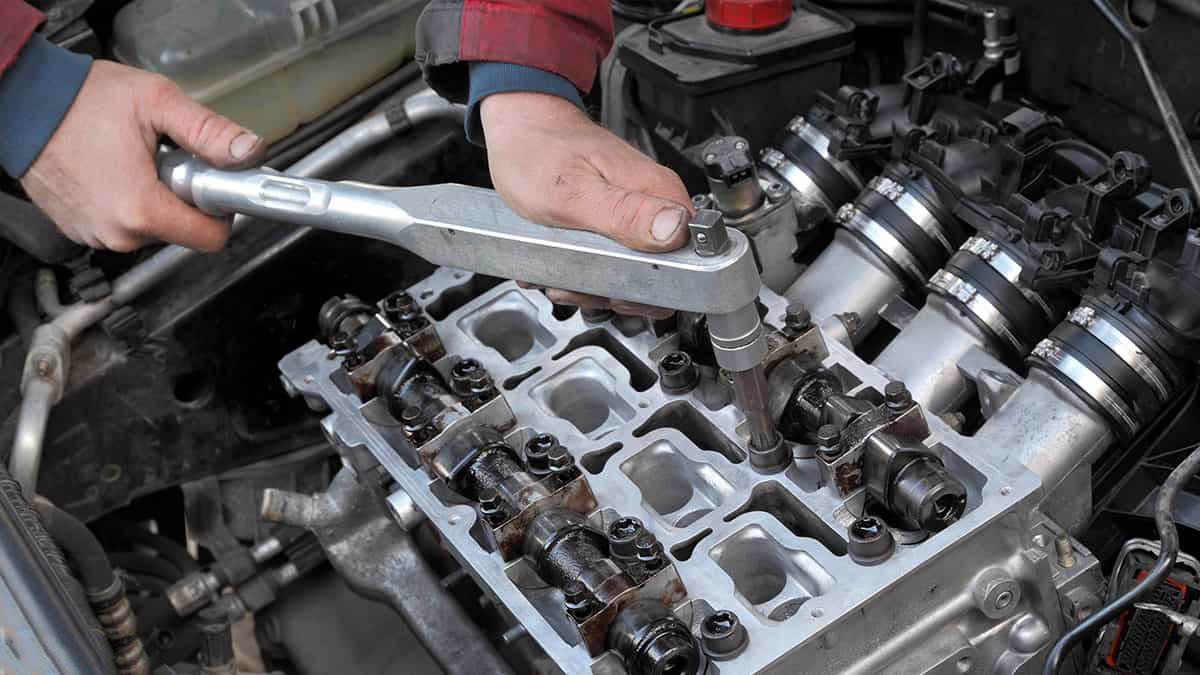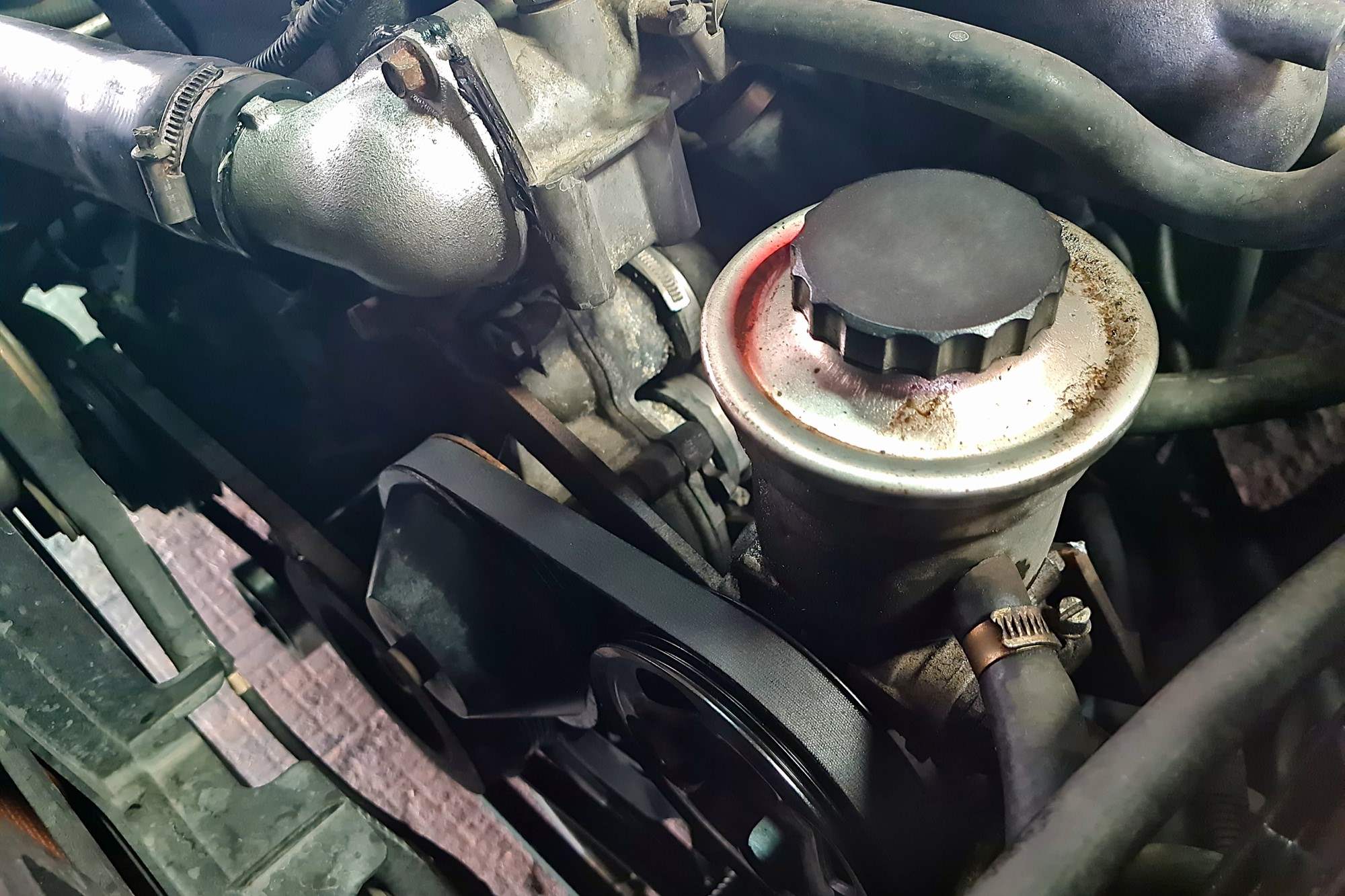Home>Automotive>5 Likely Causes Of A Ticking Noise In Your Car


Automotive
5 Likely Causes Of A Ticking Noise In Your Car
Published: January 22, 2024
Discover the top 5 likely causes of a ticking noise in your car. Get expert insights on automotive issues and solutions. Keep your car running smoothly!
(Many of the links in this article redirect to a specific reviewed product. Your purchase of these products through affiliate links helps to generate commission for Noodls.com, at no extra cost. Learn more)
Table of Contents
Introduction
When you're cruising down the road, the last thing you want to hear is an unfamiliar ticking noise emanating from your car. That rhythmic ticking can be a cause for concern, prompting you to investigate the source of the sound. Understanding the potential culprits behind this unwelcome noise can help you address the issue promptly, ensuring the continued smooth operation of your vehicle.
In this article, we'll delve into the five likely causes of a ticking noise in your car. From loose or damaged belts to transmission trouble, each potential source of the ticking sound presents its own set of challenges. By shedding light on these issues, we aim to equip you with the knowledge needed to identify and resolve the problem, restoring tranquility to your driving experience.
So, buckle up and prepare to explore the underlying factors that could be contributing to the ticking noise in your car. Whether you're a seasoned car enthusiast or a novice driver, understanding these potential causes will empower you to take the necessary steps to address the issue and ensure the optimal performance of your vehicle. Let's embark on this journey to uncover the mysteries behind that persistent ticking, arming you with the insights to tackle the problem head-on.
Loose or Damaged Belts
One of the primary suspects behind the ticking noise in your car could be loose or damaged belts. Within the intricate machinery of your vehicle, the belts play a crucial role in driving various components, such as the alternator, air conditioning compressor, power steering pump, and water pump. Over time, these belts can wear down, become loose, or develop cracks, leading to the telltale ticking sound that you may hear.
The serpentine belt, in particular, is a common culprit when it comes to generating a ticking noise. This essential component is responsible for transferring power from the engine to various vital systems within the vehicle. When the serpentine belt becomes loose or worn, it may slip or produce a ticking sound as it moves along the pulleys.
Moreover, the timing belt, which synchronizes the rotation of the engine's crankshaft and camshaft, can also be a source of ticking if it becomes worn or damaged. As the timing belt operates in close proximity to the engine, any irregularities in its condition can result in a noticeable ticking noise.
To address this issue, it's essential to conduct a visual inspection of the belts, checking for signs of wear, fraying, or looseness. Additionally, the tension of the belts should be examined to ensure they are properly adjusted. If any belts show signs of damage or wear, it's imperative to have them replaced promptly to prevent further complications and eliminate the ticking noise.
Regular maintenance and periodic inspection of the belts can help prevent potential issues, ensuring that they remain in optimal condition. By addressing loose or damaged belts, you can mitigate the risk of more severe damage to your vehicle and maintain a quiet, smooth driving experience.
In summary, when confronted with a ticking noise in your car, the condition of the belts should be a key focus of your investigation. By understanding the role of these essential components and recognizing the potential warning signs of wear or damage, you can take proactive measures to address any issues and preserve the optimal functioning of your vehicle.
Exhaust Leak
An exhaust leak is another potential culprit behind the mysterious ticking noise in your car. This issue arises when there is a breach or damage in the exhaust system, allowing the escape of gases before they reach the designated exit point. As the gases flow through the compromised area, they can create a distinct ticking or hissing sound, signaling the presence of a leak within the exhaust system.
The exhaust system plays a critical role in guiding the harmful emissions away from the engine and the passenger compartment, ensuring the safe and efficient operation of the vehicle. It consists of various components, including the exhaust manifold, catalytic converter, resonator, and muffler, all interconnected by a network of pipes. Any damage or perforation in these components can lead to an exhaust leak, triggering the characteristic ticking noise.
One common source of an exhaust leak is a cracked or damaged exhaust manifold. This component is responsible for collecting the exhaust gases from the engine's cylinders and channeling them into the exhaust system. Over time, the intense heat and constant exposure to the elements can cause the manifold to develop cracks or fissures, allowing the gases to escape and produce the distinctive ticking sound.
Additionally, rust or corrosion can weaken the integrity of the exhaust pipes and other components, leading to potential leaks. Vibrations and fluctuations in temperature can exacerbate these issues, causing the metal to degrade and develop perforations. As a result, the escaping gases can generate a ticking noise as they pass through the compromised sections of the exhaust system.
Identifying an exhaust leak requires a comprehensive inspection of the exhaust system, focusing on the manifold, pipes, and other components for signs of damage, corrosion, or deterioration. The use of specialized equipment, such as smoke tests, can aid in pinpointing the exact location of the leak, facilitating its prompt repair.
Addressing an exhaust leak is crucial not only for mitigating the ticking noise but also for ensuring the safety and environmental compliance of your vehicle. Left unattended, an exhaust leak can lead to the release of harmful emissions into the passenger compartment, posing health risks to the occupants. Moreover, it can result in decreased fuel efficiency and engine performance, emphasizing the importance of resolving this issue expediently.
In summary, an exhaust leak can manifest as a ticking noise in your car, signaling potential damage within the exhaust system. By recognizing the significance of this issue and conducting thorough inspections, you can take proactive steps to identify and rectify any leaks, preserving the integrity and functionality of your vehicle's exhaust system.
Engine Issues
When it comes to the potential causes of a ticking noise in your car, engine issues stand out as a significant concern that demands prompt attention. The intricate and dynamic nature of the engine, with its multitude of moving parts and precise mechanisms, makes it susceptible to various issues that can manifest as an audible ticking sound.
One of the primary culprits behind engine-related ticking noises is the valvetrain. Within the engine, the valvetrain comprises a complex assembly of valves, lifters, pushrods, and camshafts, all working in harmony to regulate the intake of air and fuel and the expulsion of exhaust gases. When the components of the valvetrain experience wear, damage, or improper lubrication, they can produce a distinct ticking sound as the engine operates.
In particular, worn or faulty lifters, also known as tappets, can contribute to the ticking noise. These components are responsible for maintaining the proper clearance and ensuring smooth operation between the camshaft and the valves. Over time, lifters can wear down, leading to increased clearance and causing a tapping or ticking sound as they interact with the camshaft and valves.
Moreover, inadequate lubrication within the valvetrain can exacerbate the ticking noise, as the lack of sufficient lubricant can result in increased friction and wear among the components. This can lead to a distinct tapping sound, signaling the need for immediate attention to prevent further damage to the valvetrain and the engine as a whole.
Another potential source of engine-related ticking is the piston and connecting rod assembly. As the pistons move within the cylinders and the connecting rods transmit the force to the crankshaft, any irregularities or wear in these components can generate a noticeable ticking sound. Issues such as worn piston rings, excessive piston-to-cylinder clearance, or loose connecting rod bearings can contribute to the ticking noise, indicating the need for thorough inspection and potential repairs.
Furthermore, issues with the timing chain or timing belt can also manifest as a ticking noise within the engine. These components play a critical role in synchronizing the movement of the engine's internal parts, and any irregularities or wear can result in a ticking sound as they operate. A loose or worn timing chain or belt can produce a rhythmic ticking that correlates with the engine's revolutions, signaling the need for immediate attention to prevent potential damage to the engine's internal components.
In summary, engine issues encompass a wide range of potential culprits behind the ticking noise in your car. From valvetrain irregularities to piston and connecting rod issues, each component within the engine demands meticulous attention to ensure optimal performance and mitigate the risk of further damage. By recognizing the significance of these potential issues and addressing them promptly, you can safeguard the integrity and functionality of your vehicle's engine, ensuring a quiet and smooth driving experience.
Suspension Problems
When confronted with a ticking noise in your car, it's essential to consider the potential contribution of suspension problems. The suspension system plays a pivotal role in ensuring a smooth and controlled ride, absorbing the impact of road irregularities and providing stability and handling. However, various issues within the suspension components can lead to the manifestation of a ticking sound, signaling the need for thorough inspection and potential repairs.
One common source of ticking noises related to the suspension system is worn or damaged sway bar links. These crucial components are responsible for connecting the sway bar to the suspension control arms, contributing to the stability and balance of the vehicle during cornering and maneuvering. Over time, the sway bar links can wear down, leading to increased clearance and potential movement, resulting in a noticeable ticking sound as the vehicle navigates uneven terrain or encounters bumps and dips in the road.
Moreover, worn or damaged ball joints can also contribute to ticking noises emanating from the suspension system. The ball joints serve as crucial pivot points between the suspension components and the steering knuckles, facilitating smooth movement and articulation of the wheels. When these ball joints become worn or develop play, they can produce a distinct ticking sound, particularly when the vehicle is in motion or when the steering is maneuvered.
Another potential culprit behind suspension-related ticking noises is the presence of worn or damaged bushings. These components, found throughout the suspension system, serve to dampen vibrations, reduce noise, and provide flexibility and cushioning. However, over time, the bushings can deteriorate, leading to increased clearance and potential movement within the suspension components. This can result in a ticking sound as the vehicle traverses uneven surfaces or encounters variations in the road conditions.
Identifying and addressing suspension problems requires a comprehensive inspection of the various components, including the sway bar links, ball joints, bushings, and other key elements of the suspension system. Any signs of wear, damage, or irregular movement should be promptly addressed to prevent further complications and eliminate the ticking noise, ensuring the continued stability and performance of the vehicle's suspension.
In summary, when confronted with a ticking noise in your car, it's crucial to consider the potential contribution of suspension problems. By recognizing the significance of issues such as worn sway bar links, damaged ball joints, and deteriorated bushings, you can take proactive measures to address these concerns and preserve the optimal functionality and stability of your vehicle's suspension system, ensuring a quiet and controlled driving experience.
Transmission Trouble
Transmission trouble can be a significant contributor to the enigmatic ticking noise in your car. The transmission system, a complex assembly of gears, shafts, and clutches, plays a pivotal role in transmitting power from the engine to the wheels, enabling seamless shifts between gears and facilitating the vehicle's movement. However, various issues within the transmission can manifest as an audible ticking sound, signaling potential complications that warrant thorough inspection and timely resolution.
One potential source of transmission-related ticking noises is the presence of worn or damaged gear teeth within the transmission assembly. Over time, the constant engagement and disengagement of gears, coupled with the immense forces and pressures involved in the transmission process, can lead to wear and deterioration of the gear teeth. As a result, the irregularities in the gear teeth can produce a distinct ticking sound as they interact during gear shifts or rotational movements, indicating the need for meticulous examination and potential repairs within the transmission assembly.
Moreover, issues with the transmission fluid can also contribute to ticking noises emanating from the transmission system. The transmission fluid serves as a vital lubricant and coolant, facilitating smooth operation and dissipating heat within the transmission assembly. However, if the transmission fluid becomes contaminated, degraded, or insufficient, it can lead to increased friction and wear within the transmission components, resulting in a noticeable ticking sound as the gears and shafts interact during operation. Therefore, maintaining the proper level and quality of transmission fluid is essential to prevent potential complications and eliminate ticking noises associated with transmission trouble.
Furthermore, worn or faulty transmission bearings can also be a source of ticking noises within the transmission system. These bearings play a crucial role in supporting the rotating shafts and gears within the transmission assembly, ensuring smooth movement and reducing friction. However, when these bearings become worn, damaged, or improperly lubricated, they can produce a distinct ticking sound as they operate under load, indicating potential issues that require immediate attention and potential replacement within the transmission assembly.
Identifying and addressing transmission trouble demands a comprehensive inspection of the transmission system, focusing on the gears, shafts, bearings, and the quality of the transmission fluid. Any signs of wear, damage, or irregular operation should be promptly addressed to prevent further complications and eliminate the ticking noise, ensuring the continued smooth operation and performance of the vehicle's transmission system.
In summary, transmission trouble can manifest as a ticking noise in your car, signaling potential issues within the transmission assembly, gears, bearings, and the transmission fluid. By recognizing the significance of these potential concerns and conducting thorough inspections, you can take proactive measures to address transmission-related ticking noises and preserve the optimal functionality and performance of your vehicle's transmission system, ensuring a quiet and seamless driving experience.
Conclusion
In conclusion, the presence of a ticking noise in your car can be attributed to a range of potential issues, each demanding careful consideration and proactive measures to ensure the continued smooth operation of your vehicle. From loose or damaged belts to transmission trouble, the underlying causes of the ticking sound can vary, necessitating thorough inspections and timely interventions to address the root of the problem.
Understanding the significance of these potential culprits empowers you to take a proactive approach to maintaining the optimal functionality of your vehicle. By recognizing the warning signs and conducting regular inspections, you can mitigate the risk of potential complications and ensure a quiet and controlled driving experience.
When confronted with a ticking noise, it's essential to conduct a systematic investigation, starting with the inspection of the belts, exhaust system, engine, suspension components, and transmission assembly. By focusing on these key areas, you can pinpoint the source of the ticking noise and take the necessary steps to rectify the underlying issues.
Moreover, prioritizing regular maintenance and periodic inspections can significantly contribute to the prevention of potential problems that may lead to ticking noises in your car. By staying proactive and attentive to the condition of your vehicle's essential components, you can minimize the risk of unexpected issues and preserve the tranquility of your driving experience.
In essence, the five likely causes of a ticking noise in your car serve as a roadmap for identifying and addressing potential concerns that can compromise the performance and safety of your vehicle. By delving into the intricacies of these issues and recognizing their significance, you can navigate the challenges associated with ticking noises and ensure the continued reliability and functionality of your car.
So, the next time you hear that familiar ticking sound, armed with the insights from this exploration, you can approach the situation with confidence, knowing that you have the knowledge and understanding to address the issue effectively. By staying attuned to the potential causes and taking proactive measures, you can maintain a quiet, smooth, and enjoyable driving experience, free from the enigmatic ticking noise that once caused concern.














